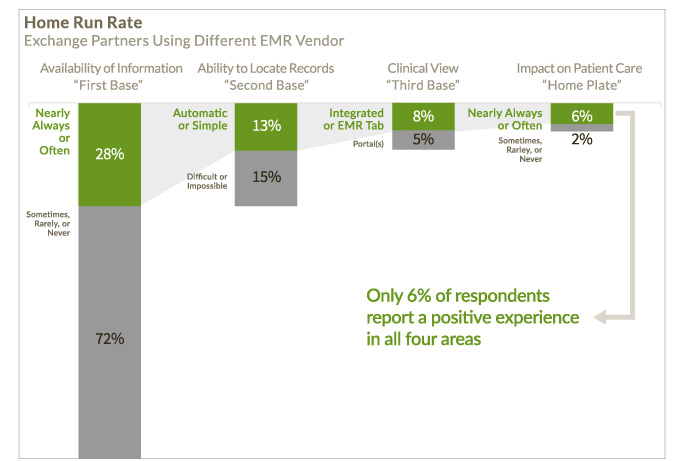HealthManagement, Volume 16 - Issue 4, 2016
A mere 6% of clinicians can effectively access information from
healthcare providers using a different electronic medical record (EMR) in order
to facilitate improvement to patient care, according to KLAS Research’s recent
report Interoperability 2016: From a Clinician View— Frustrating Reality or
Hopeful Future? While this is a low percentage, Bob Cash, Vice President
Provider Relations and co-author of the KLAS report, said that this is from a starting
point of 28% of providers being able to regularly access data from different
EMRs. Each stage is additional to the previous stage, so the last stage—impact
on patient care—means that information has to be available, locatable and in
the workflow. Access is only the first step on the path to interoperability
that improves patient care.
The survey, which used the interoperability measurement tool defined and agreed upon by healthcare providers and EMR vendors at the KLAS Keystone Summit in October 2015, also assessed whether available records were easy to locate (reported by 13% of respondents) and if the shared data could be received and located within the clinician’s workflow (8%).
See Also:Industry sets interoperability model
Willingness to improve interoperability is evident amongst EMR vendors, healthcare providers, regulators and facilitators who attended the KLAS Cornerstone Summit in August 2016, noted Cash. Delegates included representatives from the Office of the National Coordinator for Health Information Technology (ON C), the College of Healthcare Information Management Executives (CHI ME) and the American Medical Informatics Association (AMIA). “There was great collaboration and enthusiasm for making this better,” said Cash.
KLAS researchers also questioned healthcare providers about their experiences with CommonWell, the not-for-profit trade association dedicated to achieving cross-vendor interoperability and Carequality, a public-private initiative that enables widespread, operational connectivity between and among existing health IT data exchange programmes and platforms. The KLAS survey reports that clinicians are hopeful that these initiatives will improve interoperability. However, while these initiatives assert that they have thousands of participating providers, to date KLAS validation efforts show that only a relatively small subset of providers is actively sharing data today.

Cash reports that there remains concern from providers about
lack of a national infrastructure for interoperability, and specifically the
need for a national patient identifier. The full report Interoperability 2016:
From a Clinician View— Frustrating Reality or Hopeful Future? is available from
KLAS Research, klasresearch.com. The survey will be repeated in future to
measure interoperability progress.
Key Points
- Only 6% of providers are successful with all four
interoperability bases
- Both acute and ambulatory care settings see significant and
strikingly proportional deficits in usable, useful information exchange
- Effective sharing of information happens, on average, six
times more between organisations on the same EMR product than between
organisations with different EMR products
- Satisfaction ratings for how well vendors support interoperability
are some of the lowest in any area
- KLAS measures
- Overall, facilitator vendors are rated higher than EMR vendors
for supporting interoperability
About KLAS
KLAS is a research and insights firm on a global mission to improve healthcare delivery by amplifying the provider's voice. Working with thousands of healthcare professionals and clinicians, KLAS gathers data and insights on software, services and medical equipment to deliver timely reports, trends and statistical overviews. The research directly represents the provider voice and acts as a catalyst for improving vendor performance. Follow KLAS on Twitter at twitter.com/KLASresearch.



